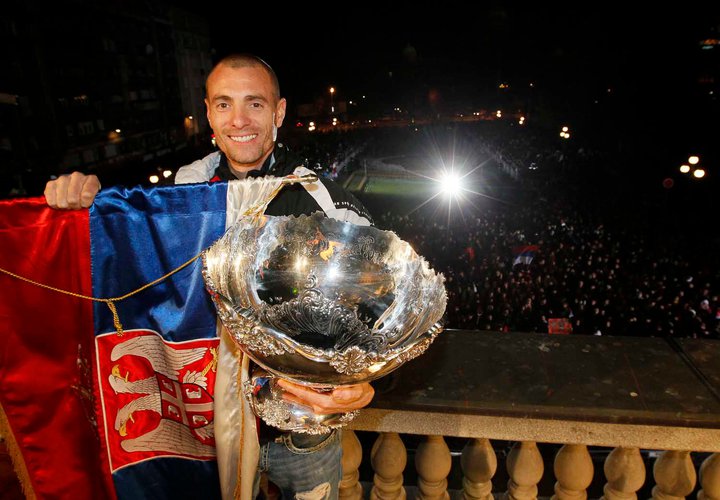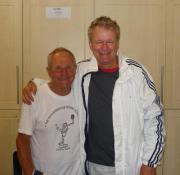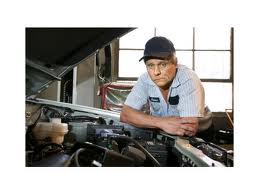
Our first Q&A of the year is with Boris Bosnjakovic. I first met Boris while playing SoCal Open tournaments and I was quickly impressed by his massive game - which resembled Boris Becker in every sense of the world - as well as agility, finesse, great attitude and lively sense of humor. One could easily see why he dominated the open circuit and also performed quite well at the D-1 level.
Quick Bio: I was born and raised in Novi Sad, Serbia (former Yugoslavia). Grew up practicing with Monica Seles at the same tennis club. Yugoslavian Junior Champion under 18s. Named to Yugoslavian Davis Cup in 1992. Moved to the U.S. in 1992 at the age of 18, ranked top 50 junior ITF in the world. Played No.1 at Brigham Young University for all 4 years and graduated in 1997. On the ATP Tour from 1997-2000, with best ranking at 740 in the world in singles. Coached on the ATP and WTA tours from 2000 to present. Coached 3 women ranked in top 100 in the world. Also worked with several top 200 ATP pros and now coaching current World Champions, the Serbian Davis Cup Team (including world No.1 Novak Djokovic).
1. When did you start playing tennis?
I started playing at the age of 9, which is according to today's standards considered late. These days the kids start as early as 3 years old.
2. What first attracted you to the sport?
To be honest, when I was young I loved soccer, since my dad was a professional soccer player, but then one of my best friends took up tennis and couldn't stop talking about it. I was very competitive, so I wanted to start learning tennis to be able to beat him, and eventually I fell in love with tennis.
3. What were the conditions like when you started (economic, political, etc.)? Also, who were some of your contemporaries (e.g., Dusan Vemic) and how did you match up against them in the juniors?
The conditions were actually pretty good. My club (T.C.Vojvodina) had enough funds to pay for most of my traveling and coaching expenses. Life in Yugoslavia in late 70's and 80's was good. Since, I was two years older then Dusan Vemic and Nenad Zimonjic, I was a bit of their elder and used to kick their butts back then. But, we all got along great and traveled together to many junior tournaments around the world.

4. If you had to generalize the Serbian approach or mentality when it comes to tennis, how would you describe it?
Well, in general I think Serbians are fighters, especially the kids that started playing tennis in the 90's, when the civil war started in former Yugoslavia and the times were tough. The kids realized that tennis could be their way out of the war-torn country, so they played for a lot more then most kids in the western world. Therefore, they became a bit tougher mentally as well and in general very hard workers.
5. Who was your tennis idol growing up? Why?
I really enjoyed the way Boris Becker and Pete Sampras played. I tried to tailor my game after theirs and play a very offensive and aggressive tennis. Even though I didn't come to the net quite as much as them, I did play have a very aggressive style with a big serve and powerful forehand.
6. What was your favorite thing to work on in practice? For example, drills, points, patterns, mix?
I always enjoyed competing, so doing drills was fun, but only if some kind of a game was involved. In general I found that playing lots of tournaments worked well for me. Then I would go and drill and work on my game a bit, but would get back out to play matches as soon as possible.
7. From recollection, you moved to Los Angeles and dominated the junior and open divisions before playing #1 for BYU and establishing a great college career there. What are your thoughts on college tennis and your overall experience?
Yes, you are correct. Domination, is how I like to remember my first few years in Los Angeles. I'm joking. First of all, my college experience was not a typical American college experience since I went to a very religious school. However, that was probably good for my tennis career, since there were not too many distractions. People at BYU took good care of me. We had a great coach (Jim Osborne), also I played #1 in both singles and doubles and therefore got to play against all the best players in college tennis. I recommend college tennis to most junior player, since the level of play is very high and it is a good stepping stone for those players who eventually want to turn pro.
8. Knowing what you know now and having the benefit of your current experience and lifestyle, what advice would you give yourself as a 15year old (i.e., if you could go back in time)?
Great question. I would certainly take a much better care of my body. Not only be in better shape then I was and work harder, but also tailor a specific diet for myself and work a lot more on the mental toughness through meditation, yoga and specific breathing exercises. I am a strong believer that a proper diet, stretching, and most importantly being able to control your mind and emotions makes a complete athlete. A fact that is really surprising to me is that most players, even in the very top of the game don't work enough on these aspects. I had a chance to witness this theory put in play when Novak Djokovic hired Dr. Igor Cetojevic in 2010 to help him on all these aspect of his game. At that time (in early 2011) I was replacing Novak's coach Marian Vajda at a few tournaments and I learned a lot from Dr. Igor's work with Novak. This guru was able to help Novak put all the puzzle pieces together and become No.1 in the world in a very dominating fashion. Ever since then became good friends with Dr. Igor and I've been working closely with him, learning all of his secrets.
9. You are the coach for the Serbian Davis Cup Team and have been instrumental in your country's success. At the same time, you have worked with players at all levels. How does coaching at the highest level differ from the rest of the game? For example, more fitness, mental, strategy, technique, etc.
The Serbian Davis Cup captain Bogdan Obradovic put me in charge of coaching our Davis Cup Team in 2010, and I was lucky enough to be a part of the championship team that year, since we were able to capture the Davis Cup Trophy for the very first time in Serbian history that year. Coaching tennis at all levels made me aware that there are so many great players all over the world in all the categories and that tennis is a very tough and competitive game. So, it made me appreciate the guys that are in the very top. Needless to say that they are all extremely good, but why are the some players consistently better then others, when they all can slug the ball so well?
I know it's a cliche that they are mentally tougher, but it really is true. Mental toughness, however is not only what happens on court. It starts when you are a kid practicing against the wall and with your friends, and it continues with your support system (your family, coaches) and the amount of practice you put in growing up. This is where the real confidence comes from, knowing that you put in the work and you had the experience required to put away that forehand to win Wimbledon one day. The important thing is to have your whole life in balance when you are out there competing against the whole world. The happiness in your personal life gives you that balance and strength to succeed. What makes you personal life complete is your support system, which for example could be your significant other, your coach, your parents, your trainer, your best friend, and all the people that help you on your journey. All these little things put together create a champion.
10. What is your best tennis experience so far? This could be tournament won, being alongside the DC team while they're crushing their competitors, rankings achieved, helping students?
I have to say that winning the Davis Cup Trophy with the Serbian Team was really an amazing experience. But, that was a team effort, which is very different when compared to winning matches and tournament in my playing career. It really is hard to point out one experience, but a few of them include becoming the best junior in my country, winning my frist ITF World Junior tournament in 1992, qualifying for the NCAA singles Championships in 1997, beating Michael Joyce which was my first win over a top 100 ATP player.
11. Davis Cup seems to be of higher importance overseas (Europe, S. America and Australia) than in the US. To what do you attribute this factor?
I am not entirely sure why that is, but it's possibly because there are so many more popular team sports in the U.S. It's is unfortunate that it is so, because Davis Cup competition creates a team sport experience out of an individual sport, which is very unique.
12. CAtennis.com has a magic wand that has the power to transform you into the commissioner of tennis (worldwide). What are some of the things that you would change in order for tennis to be a better experience for fans, players, coaches, tournament, parents, etc.?
I like that title, can I keep it? As far as the fans are concerned, I believe that it would benefit them to spend more time watching lower level tennis tournaments, such as college tennis, pro challengers and futures. There are some very good and exciting matches there and the atmosphere is much more interactive and lively. Also, that would allow them to appreciate the quality of those guys and of course the brilliance world's top players
The parents, coaches and players would all benefit if we all realized that it's just a game. In the last 20 years or so, since big money was introduced to the top players, the game has become too much of a business and a lot of the times it's taken too seriously. Young players should learn to practice in groups, socialize more and have fun, and that is why college tennis is very helpful.
13. Where do you see yourself in 5 years?
I ask myself that every morning. I hope to be in a position to educate young tennis players, other athletes and general public about the importance of a balanced life in order to be happy and successful. The majority of us in the western world have forgotten what's important in life and we are involved in a race for irrelevant and a lot of the times unobtainable things and we tend to neglect our health and well being. This is also very important for young tennis players to know in order to have a good foundation for a successful career.
14. What is one thing that you wish that more Americans should know about Serbia?
The first thing that comes to mind is that I wish that more Americans would visit Serbia to get to know the great hospitality and the fun people. Oh yeah and great Serbian food.
15. Given your countrymen's current success, have you seen an explosion in tennis interest over the last couple of years in Serbia?
Yes, it's very apparent. When I was a kid you would see everyone walking around with a soccer ball or a basketball in their hand. Nowadays most kids have a Djokovic t-shirt on and walking around with a tennis racket. We had only two tennis clubs in my hometown when I started playing, now there are numerous clubs all over the place. [Editor's Note: WATCH OUT!!!!]
Boris, we thank you for you time and wonderful insights and wish you the best of luck in all your future endeavors.
 Monday, February 13, 2012 at 10:40AM
Monday, February 13, 2012 at 10:40AM  CAtennis
CAtennis  "But that's NOT what I said!!!" Have you ever had a discussion with your coach or your child's coach that has ended or included a statement along the lines of the above? Chances are that, if you've been around this game long enough, you have been exposed to these sentiments on more than one occasion. You see, communication is often an imperfect endeavor. What I think, is not necessarily what I put into words; what I put into words is not always what you hear; what you hear is not always what your brain translates. Therefore, it is imperative for both player and coach to choose their words wisely and use some critical thinking skills (along with patience) in order to synthesize and grasp the message.
"But that's NOT what I said!!!" Have you ever had a discussion with your coach or your child's coach that has ended or included a statement along the lines of the above? Chances are that, if you've been around this game long enough, you have been exposed to these sentiments on more than one occasion. You see, communication is often an imperfect endeavor. What I think, is not necessarily what I put into words; what I put into words is not always what you hear; what you hear is not always what your brain translates. Therefore, it is imperative for both player and coach to choose their words wisely and use some critical thinking skills (along with patience) in order to synthesize and grasp the message. 




